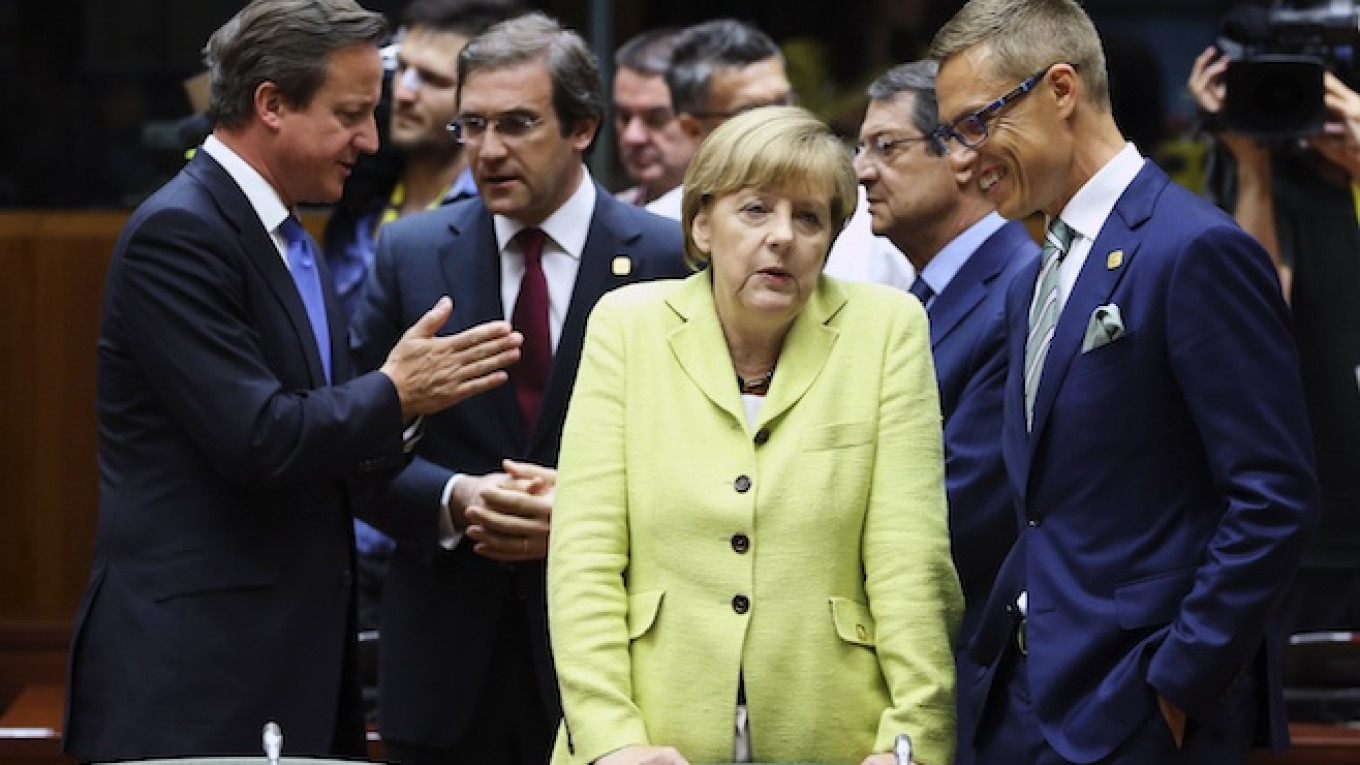European Union leaders have agreed to impose sanctions on Russian companies that help destabilize Ukraine and to block new loans to Russia through two multilateral lenders.
Wednesday's decision is a significant ratcheting-up of European pressure on Russia although it falls short of the hard-hitting economic measures against Russia for which the U.S. and hawks in the EU were pushing.
Simultaneously, U.S. President Barack Obama also on Wednesday announced the most wide-ranging sanctions yet on the Russian economy, targeting key institutions including Gazprombank and Rosneft, as well as other energy and defense companies.
German Chancellor Angela Merkel, arriving for a summit in Brussels, said the EU leaders would talk about new sanctions "because we believe that the Russian contribution to peace in Ukraine is not yet sufficient."
British Prime Minister David Cameron said the situation in Ukraine was unacceptable. "The territorial integrity of that country is not being properly respected by Russia and we need to send a very clear message with clear actions," he said.
The EU leaders said that pro-Russian separatists had failed to take all the steps the EU had demanded to defuse the situation in eastern Ukraine.
As a result, they agreed to expand EU sanctions "with a view to targeting entities, including from the Russian Federation, that are materially or financially supporting actions undermining or threatening Ukraine's sovereignty," they said in a statement issued during the summit.
The EU will draw up by the end of July a first list of companies and people to be hit with asset freezes under the new criteria.
Asked if Russian energy companies like Gazprom or Rosneft could be targeted for sanctions, an EU official said, "This is a significant broadening of the criteria, which enables a much broader list than we have yet seen, but I cannot speculate what kind of additional entities would be added."
Other Actions Eyed
The EU will also look into the possibility of targeting with sanctions companies and people that support Russian decision-makers responsible for annexing Ukraine's Crimea region or destabilizing eastern Ukraine.
EU leaders also decided to ask the EU's bank, the European Investment Bank, or EIB, to suspend new lending for Russia and to seek the suspension of new lending to Russia by the European Bank for Reconstruction and Development, or EBRD.
Russia has traditionally been the biggest recipient of the London-based EBRD's funds — it lent 1.8 billion euros ($2.46 billion) there last year. The EIB pledged to lend more than 1 billion euros to Russia last year.
Russia is one of 64 countries that are shareholders of the EBRD but, if it wins the support of other pro-Western countries, the EU should be able to block loans for new Russian projects.
The leaders also asked the EU's executive Commission to look into suspending some of the cooperation programs that are set to benefit Russia to the tune of about 450 million euros ($609 million) between now and 2020.
The EU will also draw up proposals for further measures to restrict investment in Crimea, whose annexation by Russia is not recognized by the EU.
The EU leaders said they expected international financial institutions to refuse to finance any project that recognizes the annexation of Crimea.
The leaders also agreed to remove restrictions they had placed in February on the export of military equipment to Ukraine.
Until now, the EU has imposed measures targeting 72 people in Russia and Ukraine with asset freezes and travel bans, as well as two energy companies in Crimea.
U.S. Pressure
The 28-nation EU has been under strong pressure from the U.S. and Ukraine to take a harder line against Russia but some EU governments are wary of potential retaliation from Russia, the bloc's biggest energy supplier, if they imposed trade sanctions.
Lithuanian President Dalia Grybauskaite said on arrival at the summit that the EU was "still far away" from a decision to impose sanctions on sectors of the Russian economy, or an arms or technology embargo.
Blocking loans to Russia through the EIB and EBRD marks a tightening of EU pressure but analysts said it would not have a severe economic impact on Russia.
"EBRD and EIB assistance is useful for Russia as it targets good projects that are aimed at modernizing the economy and improving the investment climate," said Tatyana Orlova, a strategist at RBS in London.
"But the scope of those projects is relatively modest and Russia is not dependent on these banks' assistance," she said. "Unless we see names of important companies, markets won't really react too much."
See also:
Rosneft Oil Giant Targeted as U.S. Hits Russia With New Round of Sanctions
A Message from The Moscow Times:
Dear readers,
We are facing unprecedented challenges. Russia's Prosecutor General's Office has designated The Moscow Times as an "undesirable" organization, criminalizing our work and putting our staff at risk of prosecution. This follows our earlier unjust labeling as a "foreign agent."
These actions are direct attempts to silence independent journalism in Russia. The authorities claim our work "discredits the decisions of the Russian leadership." We see things differently: we strive to provide accurate, unbiased reporting on Russia.
We, the journalists of The Moscow Times, refuse to be silenced. But to continue our work, we need your help.
Your support, no matter how small, makes a world of difference. If you can, please support us monthly starting from just $2. It's quick to set up, and every contribution makes a significant impact.
By supporting The Moscow Times, you're defending open, independent journalism in the face of repression. Thank you for standing with us.
Remind me later.


